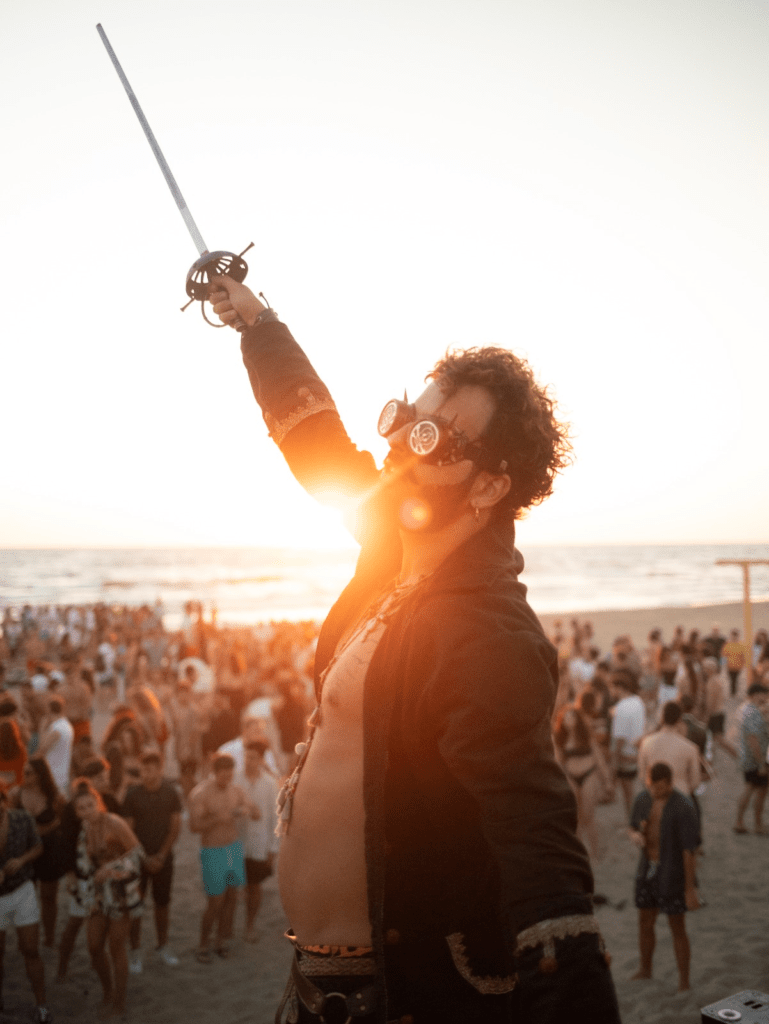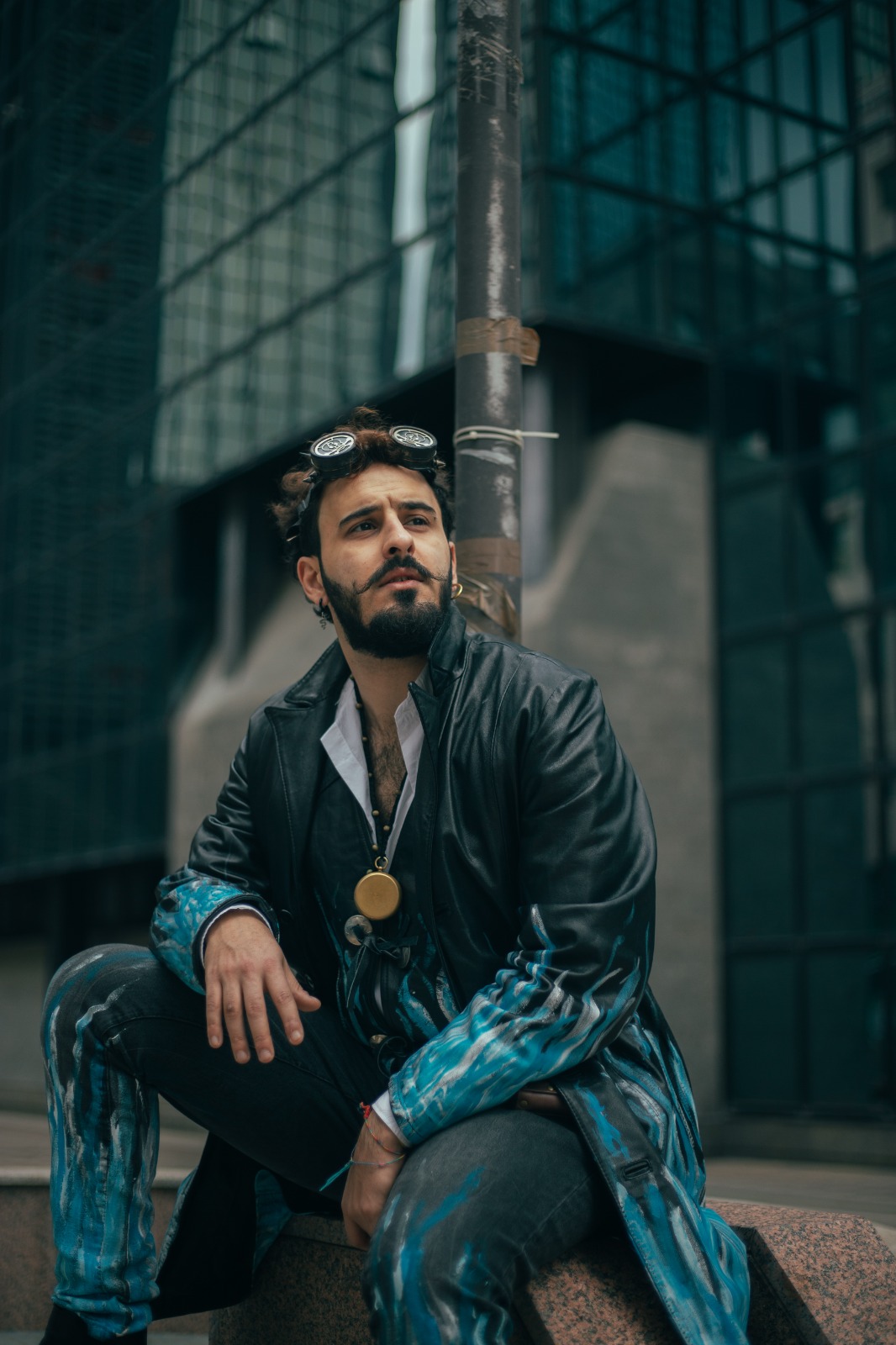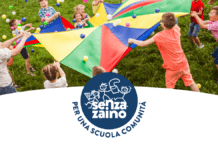Nato alle pendici del Vesuvio, cresciuto dove la periferia bacia il mare. Vesuviano (Carmine Lauretta, in foto) nasce a Cercola nel 1994 e cresce a Giugliano. Si avvicina alla musica all’età di 12 anni prendendo lezioni di flauto traverso e iniziando a calcare i primi palchi e teatri a 13 anni in vari gruppi di musica popolare napoletana.
Nel 2010 fonda una band Hard Rock-Metal (i L.A.M.F.) con i quali si esibisce con un repertorio misto di inediti e cover fino al 2013, anno in cui entra a far parte del Coro Giovanile del Teatro San Carlo di Napoli, per il quale scrive il suo primo brano in lingua italiana-napoletana: Figlio ‘e n’eruzione. L’esperienza Coro termina nel 2016 e nel 2018 fonda Gli AbCordis, un gruppo di musica Folk napoletana che durerà fino alla prima quarantena (2020), anno in cui nasce il progetto Vesuviano. “Vesuviano è il punto in cui ciò che sono stato si incontra con ciò che ancora non so di essere”. Lui stesso si racconta su ilmondisuk.
Innanzitutto, chi è Vesuviano? E perché questo nome?
«L’anagrafe mi conosce come Carmine Lauretta. Sono il primo di tre fratelli, originario di Cercola e cresciuto a Giugliano. Ad oggi medico chirurgo specializzando in Igiene e medicina preventiva presso l’Università campana “Luigi Vanvitelli” oltre che cantautore partenopeo. Il nome Vesuviano è stato un “regalo” che mi è stato fatto da uno dei componenti del collettivo “Napoli Milionaria” con cui ho collaborato tra il 2019 e il 2020. A quell’epoca ero anche il frontman di un gruppo di retaggio “folk” che portava il nome di “AbCordis”, ma allo stesso tempo ero pervaso dalla voglia di voler cominciare un progetto solista per cui necessitavo di un nome d’arte. Conoscendomi però doveva calzarmi a pennello, e quando tra le proposte mi fu avanzata quella di “Vesuviano”, io me ne innamorai sia per la versatilità, sia per il legame con le mie radici»
Ti definisci “pirata miez ‘o mare” e nelle tue canzoni troviamo tradizioni napoletane e r’n’b. I tuoi brani sono un viaggio. Ce lo spieghi questo viaggio?
«Io immagino la mia vita come un manga, o perché no, come una serie TV in cui inevitabilmente sono il protagonista (per ovvie ragioni di autopercezione e coscienza). Ogni brano per me rappresenta un capitolo ben preciso di quell’opera che si evolve insieme a me e le persone con cui si intreccia. “Vesuviano” può essere considerato a tutti gli effetti il diario di bordo della mia vita. Ed amo il fatto che si percepisca il tutto come un processo dinamico, perché è esattamente quello che voleva essere dall’inizio»

Qual è la tua formazione musicale?
«Mi sono avvicinato alla musica all’età di 12 anni studiando il flauto traverso, durante le scuole medie nell’ambito di classi musicali specifiche e parallelamente studiando privatamente. Sin da subito ho iniziato a cimentarmi anche in rappresentazioni teatrali e a suonare in gruppi di musica popolare. A 16 anni fondai la mia prima band i L.A.M.F., un gruppo Rock/Hard Rock/Metal con cui ebbi le prime esperienze in ambito di serate autonome, contest, scrittura in lingua inglese (infatti pubblicammo 4 brani su Youtube registrandoli in sala: fu divertente!) e anche le prime batoste che non mancano mai.
Nel 2011/2012 entro a far parte del Coro Giovanile del Teatro San Carlo, dove resto fino al 2016; durante questo periodo inizio a scrivere i primi testi in lingua italiana e talvolta in napoletano, e una volta terminato questo percorso decisi di mettermi “in proprio” fondando la band “AbCordis”. Parallelamente iniziai ad appassionarmi anche al mondo delle produzioni e della musica “digitale” e collaborando con il progetto “Napoli Milionaria” conobbi Alessandro Maruzzella (Aka 41Bi$$) e mentre il covid-19 e la quarantena uccidevano i live e gli AbCordis si scioglievano, componevo insieme a “41Bis$” il brano d’esordio del progetto Vesuviano: “Guardame N’faccia”, e da lì eccoci qua.
Se dovessi però, tra tutte queste cose, ricercare quella che mi ha aiutato di più è stata la musica di insieme. Quando io avevo 12 anni, i miei fratelli già suonavano da 4 anni ciascuno, nonostante fossero più piccoli di me, e subito cominciammo a interagire musicalmente intrecciando le nostre influenze e bacchettandoci a vicenda, e sono felice di poter dire che Vincenzo e Pietro (Pianoforte e Chitarra) sono ancora le mie “ali” in tutto ciò che faccio»
Nei tuoi brani, una profonda coesistenza di vari elementi, tra cui l’introspezione e l’amore. Ma non l’amore da intendersi come luogo comune; tante volte è un amore anche contingente, è ricordo, nostalgia. Nella tua “Rire” tu stesso dici «Si penso ca stess cu tte ‘na vita ma nun l’he a sapè». Cosa vuol dire per te?
«Nella scrittura di questo specifico brano, gran parte dell’ispirazione l’ha giocata la mia sirena preferita: Enrica La Femina (La femelle); io non ho fatto altro che ascoltare la sua storia e interiorizzarla.
Il “per sempre” può far paura. Ammettere di volersi votare completamente ad un altro essere umano e quindi dare in mano a quest’ultimo parte di se è un pensiero che nella mia ottica è molto serio e che non dovrebbe essere detto alla leggera. In quel momento si sta donando a quel qualcuno l’implicita possibilità di ferirci ma nonostante ciò “io provo qualcosa” di così forte da farmi sorridere nonostante tutto, nonostante forse non avrò mai il coraggio di dirtelo. In quella risata ci sono tutte le promesse che un cuore può desiderare di fare».
Nei tuoi testi prediligi la lingua napoletana. Perché? C’è qualche cantante che ti ha influenzato e/o a cui ti ispiri maggiormente?
«Io amo il napoletano, la sua musicalità, la sua versatilità, la sua espressività. Non è però sempre stato così. Tutto è cambiato una sera specifica. Avevo 23 anni e stavo attraversando un periodo difficile a livello interiore, era anche il periodo in cui dopo il “San Carlo” avevo in mente di creare qualcosa di mio e stavo provando un po’ in inglese e un po’ in italiano ma con risultati che non mi soddisfacevano. Una sera una mia amica mi propose un concerto: quella stessa sera per la prima volta ascoltai “La Maschera”, e lo feci dal vivo al “Rena Nera”. Fino a quel momento io non avevo mai considerato la possibilità di cantare in napoletano. Quella sera le parole di Roberto Colella ed il modo in cui le cantava, mi colpirono così profondamente che il giorno dopo iniziai a cantare in napoletano e da quel giorno non ho mai più smesso».
Il tuo ultimo singolo “Povere” è particolarmente intenso, suggestivo. Com’è nato questo brano?
«Durante un periodo di transizione dell’ultimo anno in cui ero ossessionato dalla paura di non riuscire a percepire la vita come avevo sempre fatto, cioè, affrontandola come una continua scoperta, una continua emozione, come se fosse una continua “prima volta”. È a tutti gli effetti una dedica alla musica e alle emozioni che mi hanno sempre spinto a scrivere sperando di non perderle mai veramente»
Attraverso le tue canzoni cosa vuoi comunicare a chi ti ascolta?
«Vorrei rendere più leggera la vita delle persone che le ascoltano. Nel tempo di una canzone sono convinto che ci siano le risposte a dubbi che alle volte neanche sappiamo di avere. Nei miei testi amo guardare in faccia i dolori e le conseguenze di questi ultimi perché sono proprio queste le cose che mi fanno apprezzare la bellezza di quello che mi circonda. Esiste sempre una luce in fondo al tunnel ed è una di quelle cose in cui non voglio mai smettere di credere»
Grazie per il tuo tempo, Vesuviano.
Ascoltiamo insieme “Rire”
Ascoltiamo “Povere”
Interview/ Carmine Lauretta (aka Vesuviano): «Io, pirata miez ‘o mare: here is the logbook of my life in music»
Born on the slopes of Vesuvius, raised where the suburbs kiss the sea
Vesuviano (Carmine Lauretta) was born in Cercola in 1994 and grew up in Giugliano. He approached music at the age of 12 by taking Flute lessons and began to tread the boards and theatres at 13 in various Neapolitan popular music groups. In 2010, he founded a Hard Rock- Metal band (L.A.M.F.) with which he performed a mixed repertoire of new songs and covers until 2013, when he joined the Youth Choir of the San Carlo Theatre in Naples, for which he wrote his first song in the Neapolitan-Italian language: Figlio e’ n’eruzione. The choir experience ends in 2016 and in 2018 he founds Gli Abcordis, a Neapolitan Folk music group that will last until the “First Quarantine” (2020) when the Vesuviano project is born. “Vesuviano is the point where what I have been meets what I still don’t know I am”.
Let’s talk to him: First of all, who is Vesuviano? And why this name?
«The registry office knows me as Carmine Lauretta. I am the first of three brothers, originally from Cercola and grew up in Giugliano. Today I am a surgeon specialising in Hygiene and Preventive Medicine at the University of Campania ‘Luigi Vanvitelli’ as well as a Neapolitan singer-songwriter. The name Vesuviano was a ‘gift’ given to me by one of the members of the collective ‘Napoli Milionaria’ with whom I collaborated between 2019 and 2020. At that time I was also the frontman of a group with a ‘folk’ heritage called ‘AbCordis’, but at the same time I was filled with the desire to start a solo project for which I needed a stage name. Knowing me, however, it had to fit me like a glove, and when the name ‘Vesuviano’ was proposed to me, I fell in love with it both for its versatility and for the link with my roots».
You call yourself ‘pirate miez ‘o mare’ and in your songs we find Neapolitan traditions and r’n’b. Your songs are a journey. Can you explain this journey to us?
«I imagine my life like a manga, or why not, like a TV series in which I am inevitably the protagonist (for obvious reasons of self-perception and consciousness). Each song for me represents a specific chapter of that work that evolves together with me and the people with whom it is intertwined. “Vesuvius’ can be considered to all intents and purposes the logbook of my life. And I love the fact that you perceive the whole thing as a dynamic process, because that’s exactly what it wanted to be from the beginning».
Would you like to explain your musical training?
«I approached music at the age of 12 by studying the transverse flute during middle school as part of specific music classes and in parallel by studying privately. Right from the start, I also started performing in theatre performances and playing in popular music groups. At the age of 16, I founded my first band, L.A.M.F., a Rock/Hard Rock/Metal group, with which I had my first experiences in independent gigs, contests, writing in English (in fact, we published 4 songs on YouTube, recording them in the studio: it was fun!) and also the first beatings, which never fail. In 2011/2012 I joined the Youth Choir of the San Carlo Theatre, where I remained until 2016; during this period I began to write my first lyrics in Italian and sometimes in Neapolitan, and once this was over I decided to set up my own band “AbCordis”. At the same time I also began to get involved in the world of production and ‘digital’ music, and while collaborating with the ‘Napoli Milionaria’ project I met Alessandro Maruzzella (Aka 41Bi$$), and while covid-19 and quarantine were killing the live shows and AbCordis were breaking up, I was composing the debut track of the Vesuviano project: ‘Guardame N’faccia’ together with ’41Bis$$’, and here we are. However, if I had to search for the one thing among all these things that helped me the most, it would surely be the fact that the first thing I learnt in my ‘musical life’ was ensemble music. When I was 12 years old, my brothers had already been playing for 4 years each, even though they were younger than me, and we immediately began to interact musically, interweaving our influences and drumming each other up, and to this day I am happy to say that Vincenzo and Pietro (Piano and Guitar) are still my ‘wings’ in everything I do».
In your songs there is an undeniable coexistence of various elements, including introspection and love. But not love to be understood as a commonplace; many times it is also a contingent love, it is memory, nostalgia. In your ‘Rire’ you yourself say ‘Si penso ca stess cu tte ‘na vita ma n’he a sapè’. What does it mean to you? What meaning did you give to these words, writing and singing them?
«In the writing of this particular song, a large part of the inspiration came from my favourite mermaid: Enrica La Femina (La femelle); all I did was listen to her story and internalise it.The ‘forever’ can be scary. Admitting that you want to give yourself completely to another human being and thus give part of yourself to the latter is a thought that in my view is very serious and should not be said lightly. In that moment you are giving that someone the implicit possibility of hurting you but nevertheless ‘I feel something’ so strong that it makes me smile despite everything, despite the fact that I may never have the courage to tell you. In that laughter are all the promises a heart can wish to make».
You prefer the Neapolitan language in your lyrics. Why did you choose to sing in dialect? Is there any singer who has influenced you and/or who inspires you the most?
«I love Neapolitan, its musicality, its versatility, its expressiveness. However, it wasn’t always like that. Everything changed one specific evening. I was 23 years old and I was going through a difficult period on an inner level, it was also the period in which after the ‘San Carlo’ I was planning to create something of my own and I was trying a little in English and a little in Italian but with results that did not satisfy me. One evening a friend of mine suggested a concert: that same evening I heard ‘La Maschera’ for the first time, and I did it live at the ‘Rena Nera’. Until that moment I had never considered singing in Neapolitan. That evening, Roberto Colella’s words and the way he sang them struck me so deeply that the next day I started singing in Neapolitan and from that day on I have never stopped».
Your latest single ‘Povere’ is particularly intense, evocative. Would you like to tell us how this track came about?
«Povere was born during a period of transition in the last year when I was obsessed with the fear of not being able to perceive life as I had always done, that is, facing it as a continuous discovery, a continuous emotion, as if it were a continuous “first time”. It is to all intents and purposes a dedication to the music and emotions that have always driven me to write in the hope of never really losing them».
What do you want to communicate to your listeners through your songs?
«I would like very much, through my songs, to make life lighter for the people who listen to them. In the time of a song I am convinced that there are answers to doubts that sometimes we don’t even know we have. In my lyrics I like to look sorrows and their consequences in the face because these are the very things that make me appreciate the beauty of what surrounds me. There is always a light at the end of the tunnel and it is one of those things that I never want to stop believing in».
Thank you for your time.










